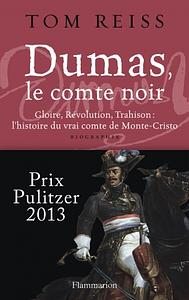Take a photo of a barcode or cover
I enjoyed this, but I was surprised by how little of the book was actual about General Dumas. There are large sections where the author goes into the context (in some case, with late 18th century Haitian society, I knew nothing, in other case, as with the early French revolution, I knew a lot). Dumas lived then, these circumstances affected him, but the details are lost and the author doesn't do much to reconstruct them, or to guess (though at least he didn't make guesses and pass it off as near certainty).
An incredibly important and well researched story. Napolean sucks!
adventurous
informative
fast-paced
adventurous
inspiring
I'd give it an extra half-star for interesting content--Relates the largely forgotten story of the father of Alexandre Dumas (author of The Three Musketeers and The Count of Monte Cristo). Dumas' father was the bastard son of a mooching aristocrat and a black Haitian slave; his father sold him to pay his own passage back to France. Eventually, though, this young man earned himself the rank of General and national hero during the French Revolution--risking his neck during the Terror with his unfashionably humane actions and attitudes--only to have his career stalled later by a jealous and annoyed Napoleon. Very interesting view of an intriguing time when black slaves in the French Carribbean had it worse than slaves in the Deep South at its worst, yet freedmen and mulattos could achieve high social standing in parts of the islands and in France; how France was the first country to pass official racial-equality laws, only to have these sharply revoked in the same lifetime by Napoleon; and, finally, how the fascinating life and experiences of this particular half-black man was the direct source for the character of Edmond Dantes and some of the exploits of the Musketeers.
It promises to be a biography of Alexandre Dumas’ father, a Republican General, but it turns into the rise of African Slavery, the creation of colonial Haiti, the history of the French Revolution, the first civil rights movement, the rise of Napoleon, his
Egyptian Expedition, and Napoleon’s reestablishment of slavery.
In the middle of it all was Count Alex Dumas, an American of color who rose to the highest ranks in the French Army, but through the personal enmity of Napoleon and some terrible luck as a prisoner of war, was denied his rightful place in history.
This is a good story about a minor historical figure and the world he lived in.
His son, the author, patterned many of his heroes on his legendary father, and this book does justice to both father and son.
Egyptian Expedition, and Napoleon’s reestablishment of slavery.
In the middle of it all was Count Alex Dumas, an American of color who rose to the highest ranks in the French Army, but through the personal enmity of Napoleon and some terrible luck as a prisoner of war, was denied his rightful place in history.
This is a good story about a minor historical figure and the world he lived in.
His son, the author, patterned many of his heroes on his legendary father, and this book does justice to both father and son.
So, the subject matter intrigued me. And the first third of the book was really interesting: background on France's history with slavery, racism and revolution. But then war and military excursions became too dominant for my taste. Honestly, I grew bored. I don't like reading about battle after battle. I quit at about 60% in.
The real inspiration for the Count of Monte Christo. My library has such a limited number of non fiction biographies, I was surprised and very pleased to find this one. I had not even realized there was a real figure behind the character and I was immediately interested.
It starts with background information on France and the colony of Saint Domingue, modern day Haiti. Having learned only the rudimentary details of France's history, it was very interesting and useful to get this snap shot into the era. I had never realized the emphasis the French had put on liberty and the number of slaves freed at the time was astounding. Doubly so was the personal freedoms of colored people, especially in a time period where in America, they were declared non citizens!
The honest, forthright man that was Alex Dumas is just as incredible. He went from a kid on a tropical coffee farm, to a slave on a ship, to a young aristocratic dandy, to a hardened military man. It's a shame so little survives to tell of him, since what does exist is almost unbelievable. To be so brash and make it through the terror of the revolution alive is a real accomplishment, when losing a battle or trying to reason with superiors could be cause for a death sentence.
Some of the events credited to him are obviously nonsense. Lifting a horse off the ground by grasping a beam and basically doing a pull up with a huge 1500 pound animal clutched between your legs is about the most ridiculous strong man story I've ever heard. Also, lifting multiple rifles on one hand by only his fingertips in the barrels? Good grief. Still, he was clearly a big powerhouse of a man, an excellent swordsman and horseman. I loved the military account of him jumping the huge ditch with his horse and shocking the enemy into surrendering on the spot.
That said, the ending is depressing and Napoleon is the biggest douschebag in history.
informative
medium-paced





